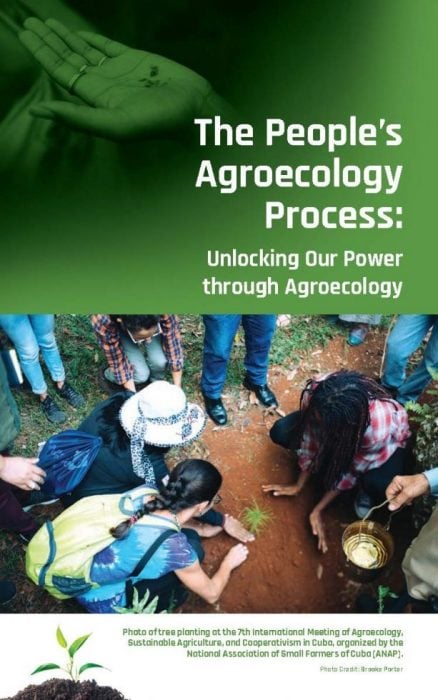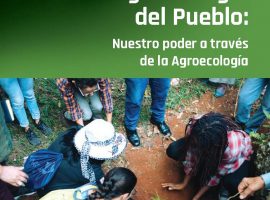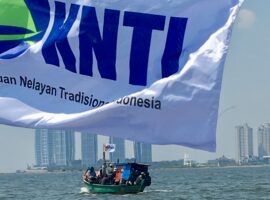Six years of experience under their belt, grassroots organizations launched this year a new publication describing their path to scale agroecology in rural and urban areas. The People’s Agroecology Process: Unlocking Our Power Through Agroecology includes personal testimonies, the method applied and a timeline of events since 2015.
“The Process” – as the initiative is called – started with the Campesino a Campesino Agroecology Encounter in Fellsmere, Florida led by migrant farmworkers. The event’s host, the Farmworker Association of Florida (FWAF), a member of La Via Campesina International, had participated in learning exchanges in Guatemala, Cuba and Brazil and took on the task to scale out agroecology among its members through a set of popular education methodologies. Through this experience, FWAF and a group of ally organizations from Puerto Rico, Canada and the United States (inspired by the Farmer-to-Farmer Methodology in Cuba) envisioned a “process” to replicate the experience in Black, Latino and Native American communities. Seven agroecology encounters later, the initiative has brought together hundreds of farmers, farmworkers, fisherfolk and urban growers to learn with each other and practice agroecology.
This new publication tells that history from the voice of the facilitators of the process and details the theory and practice of using agroecology as a tool to build power across sectors, marginalized experiences, and geographical boundaries.
You can read, download and share this publication in English and Spanish today. Please contact us if you want to volunteer to translate it in another language.
Testimonies
“The People’s Agroecology Process touches the roots of any community and transforms it for the better! This publication holds the dreams and vision of a world transformed where peasants, farm and food workers are centered and essential. That time is NOW. We all have to roll up our sleeves and work toward more harmony with the water, the land, and Pachamama, there is no other way if we are to survive.” – Angela Adrar, The Climate Justice Alliance
“Here in the US there had not existed a process that brought in US based farmworkers with La Via Campesina, MST, ATC and other organizations that had knowledge and experience. It was powerful to have had those exchanges to build solidarity with a global movement. The People Agroecology Process has been crucial especially in organizing farmworkers. Now we can articulate the food system, capitalism, and have a contextual analysis to guide us in developing strategies to win.” – Edgar Franks, United Families for Justice
“We have so much ground to cover (pun intended) to bring North America to a sustainable future. The dominant industrialized food system only generates profits for the multinational interests behind the products and technologies.. There is no consideration of the food produced, the people to be nourished or the communities to thrive through balanced environmental, social and economic gains. As evidenced by the collapse of many elements of the globalized system during the COVID 19 pandemic, and the looming crisis of climate change, this is a critical issue and agroecology is the answer. “The People’s Agroecology Process: Unlocking our Power through Agroecology” is a guidebook to the political and practical components of agroecology through our collective experience. In the true La Via Campesina way – campesina to campesina – this knowledge has been developed, adapted and shared amongst all who participate. It provides the tools and outlines to replicate and create meaningful encounters, training sessions and collectives with the emphasis on organizing to activate food sovereignty through the practice of agroecology. Agroecology is not only a farming system, it is also a human practice as peasants and small-scale farmers work together to build the solutions, techniques and understanding, as well as spread the knowledge through peasant to peasant exchange. Agroecology advocates that peasants and family farmers should be recognized and supported as key political actors of their own innovation, change and development, rather than beneficiaries of technical solutions. They are the experts within their contexts and this inspiring publication will be a valuable tool to support their leadership in the transformation towards a sustainable future.” – Joan Brady, National Farmers Union – Canada and La Via Campesina – North America
“It is with great joy that the Landless Workers Movement in Brazil welcomes this new publication on the People’s Agroecology Process. This publication addresses fundamental issues for all social movements, organizations and collectives that are building agroecology around the world, not just in the United States. First, agroecology is not just a way to produce without pesticides. It is a political conception! A way of producing food that directly confronts the capitalist model of agricultural production, based on large scale monoculture, with high use of pesticides and controlled by transnational corporations. Agroecology proves that another way of producing and living, respecting nature, the environment and people is possible. Also, the experience of the People’s Agroecology Process breaks away with the myth that agroecological production is not feasible. Agroecology is not only possible, but it is necessary! We can and must feed all people in a healthy way, without poisons. We can and must produce food for the world without destroying the planet. We can and must produce with new social and labor relationships, without exploiters or exploited. This publication is the hope of building a new world. We congratulate and thank this collective for sowing that hope in all of us!” – The Landless Workers Movement (MST)
“En buena hora! The People’s Agroecology Process is something many of us working on agroecology in North America have been looking for, for a long time. This is a powerful pamphlet that accomplishes several things at once. First, it documents the important work that has been done in the context of Agroecology Encounters in North America since 2016. Secondly, it offers inspiration for organizers of all kinds through its elaboration of the intersectional work that has been taking place through the People’s Agroecology Process. And thirdly, it will be a substantive and valuable tool for organizers in agroecology, and any other social justice struggle…this booklet continues the vital project of self-documentation and formation for North America’s foremost experts in agroecology—the peoples who have developed, practiced, and continue to grow agroecology on the ground through their lived experience and their struggles.” – Jahi Chappell, Food First





